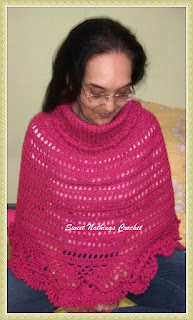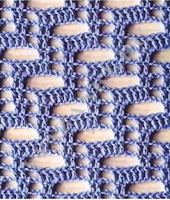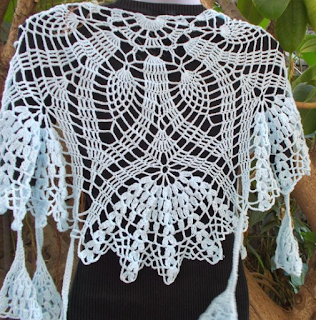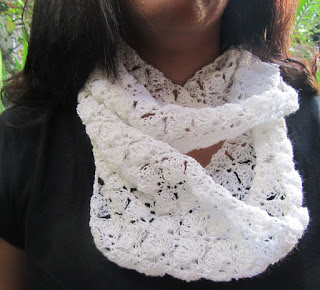This poncho has been chosen by my client, and
she wanted a cowl as well – so I just asked her if she felt confident in
allowing me to add in a cowl to the top of the poncho.. and I am thrilled that
she agreed to trying this idea out.
Thank you for joining me.
In case you have just joined me, know that you can access all of my earlier creations by checking under ‘categories’ on the right hand side of this blog under “Labels”. Then, for your convenience, follow me here or on Facebook, You Tube, Pinterest, Twitter or Instagram.
Check out all my social media handles at the bottom of this blog
Oh, and may I add that the fastest way to find any of my blogs is via Pinterest.
All my blogs can be printed. Find the printer friendly (green) link at the bottom of this blog. You can also hit Control P (or Command P for Mac) on your keyboard, and the blog will go directly to the connected printer.
Remember that you only print if absolutely essential. Save paper – Save Our Earth.
Do remember to add my blog URL when you make and show off your creation.
Just copy the link on the search bar above - that's the blog URL.
To purchase this or similar yarn online, click here to buy your yarns online via Amazon. While you will still pay the same, I may get paid by Amazon as well.
This is a free blog - so do pay it forward for me. Cheers.
Thanks for joining me once again as we work on
and discover this new pattern together.
Inspired by this photo from this pin , here are
my pattern notes on the difference I've worked on my cowled poncho.
Materials used : Today I’ve
used ~ 275 gms of our lovely Indian Vardhaman Millennium acrylic yarn with a 4
mm crochet hook ;
International yarns : Among the international yarns I have used in this thickness, I’d suggest Aunt Lydia Cotton 10, Aunt Lydia Bamboo-Viscose 10, DMC Petra, Sullivans knitting cotton (Australia), Milford Soft, Hilaza Rustica Eclat , Alize cotton yarn and Alize bamboo yarn.
Difficulty level
: Intermediate Skill level
Stitches used : Using US terminology
Single Crochet : Sc : yo, insert hk into st ; yo (2 lps on hk); yo, draw through both lps. One sc made. Check out the video at https://youtu.be/ghACqBpA-3k
Double Crochet : dc : yo, insert hk into st ; yo (3 lps on hk);
[yo, draw through 2 lps] twice. One dc made.
Chainless start for Double Crochet : I dislike the ch-2 / ch – 3 start, and this is what I do to start my row of dc.
Double crochet 4-tog as a decrease stitch : dc 4-tog : Here is an easy video tutorial for working a dc 4-tog over 4 sts at https://youtu.be/WjSNi7ithIU
Double crochet 4-tog as a decorative stitch : dc 4-tog : Here is an easy video tutorial for working a dc 4-tog all in the same stitch as a decorative stitch at https://youtu.be/_B0-ye0cClU
Abbreviations used : Using US terminology
sc : single crochet dc : Double crochet
ch : chain ch-sp : chain space
sp : space rep : Repeat
hk : hook lp (s) : loop(s)
yo : yarn over sl-st : slip stitch
dc 4-tog : Double crochet 4-together
Instruction information
Please note that I start all my rows with a ch 1, turning chain for ease.
Please check the top of this blog for easy video tutorials on all stitches used in today's pattern.
Please read through all my notes before you pick up your hook, so you know just where we're heading in our pattern.
In my patterns I work with the principle of stitch count and body measurement. This means that you need to work the stitch count in pattern, till you get the measurement (length and/or width) that you need for your project.
So before we set off on our new creative
journey, let’s take a quick look at what we’re creating here today.
The original pattern for the poncho is a lovely
free one from Drops design / Yarn studio. I have tweaked it a bit and added a
cowl to the top of the neckline.
So in our pattern, we will start with the cowl
bit first. We will work this up and down
in back loops only and then we will work around the base of one side of this
cylinder like piece, and start on the poncho, which we will use the pattern
given on the Yarn studio pattern sheet.
For this first part, all I’d say is work in back
loops only to get the ribbed effect that we’re looking for. So you can work either with sc or hdc in back
loops only. As you’ve guessed, if we
work in hdc, you will get a thicker stitch, which will make it a thicker ribbed
look.
We will start with a fsc (Foundation Single
crochet) which will make the width of your cowl. We will work a rectangle that will go around
the neck of the person you are making this for.
The width that you want to make it for depends on you. You can either make it slim, so that it just
goes around the neck, or you work it double the neck width, such that it folds
over and can be nice and warm around the neck.
How do we calculate how many stitches you are
starting with for our cowl part? Take quick look at the pattern sheet for the
poncho. The start stitches there are 95-101-107-113-119-125. So we need to ensure that we have these
stitches at the end of our ribbed cowl as well.
We are working our blo-ribbed cowl from side to
side which means that we are working from the top to the bottom of the neck –
or rather from the bottom of the chin to the top of the shoulders. We will be working this as a cylinder. We will then work around the base of one of
these openings, which will be the top of the shoulders for the poncho. Make sense?
Take a quick look at the diagram below to help
understand what we’re working on now.
So to start, you will need to look at the main
pattern sheet, and see which size you are making – and depending on the start
number for the pattern sheet, that’s the number that you will end with here on
our cowl.
Now one major thing that you need to note is
that the poncho pattern is worked in rows to start and then you leave a vent
and work in rounds later on.
If
you are working this cowl on top, then you will need to work in rounds
from the top of the shoulders all the way down.
So you will need to see how many stitches you need for an easy fit
around the shoulders on the first row of your poncho, and then work the pattern
in rounds from Round 1 of the poncho as well.
So this means, if we are starting with 95 sts
for the main poncho, then we get 95 rows for the cowl.
Start with as
many fsc as you want for the width of your cowl. Turn.
Note : The number
of start stitches does not affect the lower part of the poncho. You need to decide if you want it long or
short – long meaning it will fold over, which is what I’ve made. So if you’re making it short, you will make
it one neck length (i.e the length from the base of your chin to the top of the
shoulders or base of neck) and if you want this long, then you will make double
this measure.
Row 1 : sc in the 1st
fsc ; sc blo in the next fsc and in each fsc till the end. Turn.
Row 2 : sc in the 1st
sc ; sc blo in the next sc and in each sc till the end. Turn.
Now here’s where you will need to figure out how
many repeat rows you need. We refer to
our pattern sheet for the poncho and sees that the start numbers there are 95-101-107-113-119-125.
So say you are working say a start of 95
stitches for your poncho, then you will work 93 more rows for the cowl.
If you are working with a start of 101, then
you will work 99 more rows for our cowl. Get it?
At the end of the cowl rectangle, you should
have the same number of rows as the start number of stitches for your
poncho
Row 3 – 95 / 101
/ 107 / 113 / 119 / 125 :
Rep Row 2.
Join your two sides and make a cylinder. We will now work along one of the ends of our
cylinder for the poncho.
As you have worked 95-101-107-113-119-125
rows, you will have the perfect number of stitches for our first row of the
poncho.
I have done one row of sc all around, so that
we have a neat base to start with.
So
for your first round of the poncho, I suggest you do the same and then carry on
with the pattern for the poncho on the link above.
Enjoyed this ?? I sure did.. come back right
here for more freebie patterns
Have a great day and see you soon.
Here are some of my earlier neckwear creations.
AND for our four legged pals.. some fancy neckwear at
Here are some of my older bolero / jacket / vest creations. Have fun with these free patterns too
and here are some tops.. that a bolero would look swell over..

http://shyamanivas.blogspot.in/2016/05/esss-crossed-over-infinity-cowl.html
http://shyamanivas.blogspot.com/2014/12/infinitely-simple-mobius-cowl.html






























































































No comments:
Post a Comment
Thanks for taking the time to stop by. Do tell me what you think. Cheers